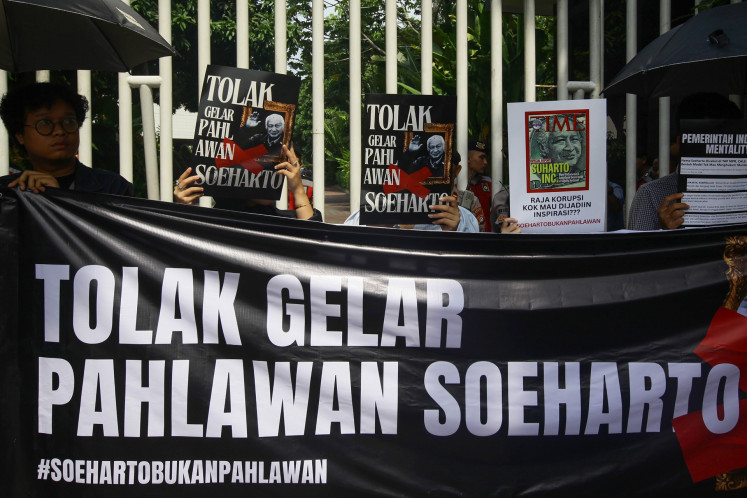Popular Reads
Top Results
Can't find what you're looking for?
View all search resultsPopular Reads
Top Results
Can't find what you're looking for?
View all search results(Don't) Kill foreign lawyers
It is hard to believe that to this day no clear rules have been put in place with regards to the practice of foreign lawyers in Indonesia
Change text size
Gift Premium Articles
to Anyone
I
t is hard to believe that to this day no clear rules have been put in place with regards to the practice of foreign lawyers in Indonesia. The country certainly lags far behind neighboring countries such as Singapore when it comes to the issue.
The only piece of legislation in Indonesia that deals with foreign law practice is Article 23 of the 2003 Law on advocates. Paragraph (1) of this article stipulates that foreign lawyers are not allowed to appear in court under any circumstances or open their own offices (including representative offices) in Indonesia.
The only exception to this rule is provided in Paragraph (2), which says that a foreign lawyer can work in Indonesia only if he/she is employed by an Indonesian law firm as a staff member or advisor on foreign law, and his/her employment requires prior approval from Indonesia's Law and Human Rights Ministry following a recommendation from the Advocates Organization. Furthermore, during their employment in Indonesia, based on Article 23 (3), the foreign lawyer must provide free legal services in the form of legal education and research.
Realizing that the wording of the aforementioned provisions is so basic, Article 23 (4) of the Advocates Law requires the Law ministry to issue an implementing regulation to detail the procedure for employing foreign lawyers and mechanism to provide mandatory free legal services. On Dec. 17, 2004 the ministry issued a decree concerning the issue, but unfortunately, some of the provisions in the decree are not sufficiently clear.
Although the Advocates Law restricts foreign lawyers from establishing offices in Indonesia, some law firms have found a loophole by incorporating their firms with business consulting companies and openly offer services to businesses in Indonesia. Besides, many international law firms are affiliated with Indonesian firms to enable them to do business here.
In the past few years, such arrangements have increased. They seem to have ignored the policy that restricts foreign lawyers from engaging in legal services in Indonesia.
A number of overseas law firms have deliberately employed Indonesians as a means to tap into the market. They must be aware that under the Advocates Law, unless a person has been admitted to the Indonesian Advocates Organization, it will be illegal for him/her to practice law in Indonesia.
Many foreign lawyers simply provide services to their Indonesian clients, when needed. They work by flying into Indonesia to cater to the needs of their client. They must be reminded that business visas may not be sufficient to continuously fly-in and fly-out of Indonesia for the purpose of practicing law in Indonesia.
The massive influx of foreign lawyers and the growing influence of foreign lawyers in the Indonesia's legal services market have raised concerns among Indonesian lawyers. Therefore, it is no surprise that when interviewed by The Financial Times recently, Otto Hasibuan (Chairman of PERADI ' one of the largest advocates associations in Indonesia) said: 'If we want to protect our lawyers, we must not allow foreign lawyers to practice here.'
After remaining silent since on the issue since its inception in 2005, PERADI recently made an unusual policy by requiring foreign lawyers who want to work or continue to work in Indonesia to take a legal course and an exam on the Code of Ethics of Indonesian Advocates. Simultaneously, PERADI has warned that failure to comply with these requirements can lead to difficulties for foreign lawyer applying for a work permit in Indonesia to obtain a PERADI recommendation.
This policy clearly suggests that PERADI has taken a firm stance toward foreign lawyers. This cannot be perceived as a move to pave the way for the foreign lawyers to practice Indonesian law, which may have been misunderstood by some. The present Advocates Act only allows Indonesian citizens to practice Indonesian law.
The dubious and uncontrolled practice of foreign lawyers, combined with the absence of a good regulatory system, will potentially trigger chaos in the legal services sector. To facilitate fair play in the legal services market, the dos and don'ts relating to the practice of foreign lawyers in the country is urgently needed. The lack of regulation on foreign lawyers will discourage qualified foreign lawyers with genuine commitments to help develop Indonesia's legal profession and the Indonesian economy from entering the country.
As Indonesia has been required to gradually eliminate the barriers of entry for foreign lawyers, the Law ministry decree should be amended pending the enactment of the new Advocates Act. Appropriate provisions on the qualifications of foreign lawyers permitted to practice in Indonesia should be in place. For example, a requirement should state that in order for foreign lawyers to practice in Indonesia, they must meet specific standards related to experience, expertise as well as commitment in developing Indonesia's legal professionals. If legal matters related to Indonesian law are to be handled exclusively by Indonesian lawyers, then it will be necessary to include a provision that restricts law firms that have entered into formal associations with foreign firms to provide any advice based on Indonesian law.
It would also be necessary to create a competent and sustainable body to oversee the activities of the foreign lawyers and to set up an effective system to monitor the implementation of the transfer of knowledge and skills by the foreign lawyers for the betterment of Indonesian legal professionals and for civil society in general.
On a parallel front, initiating reforms in the legal education and training sector is necessary to ensure availability of a superior talent pool in the legal sector. In addition to level legal courses, today's lawyers need to learn about the role of information technology in delivering legal services and acquire relevant soft skills in order to stay sustainable in the Indonesian legal industry.
__________________
The writer is principal of Budidjaja & Associates and chairman of the Indonesian Christian Legal Society (ICLS). The views expressed are personal.










